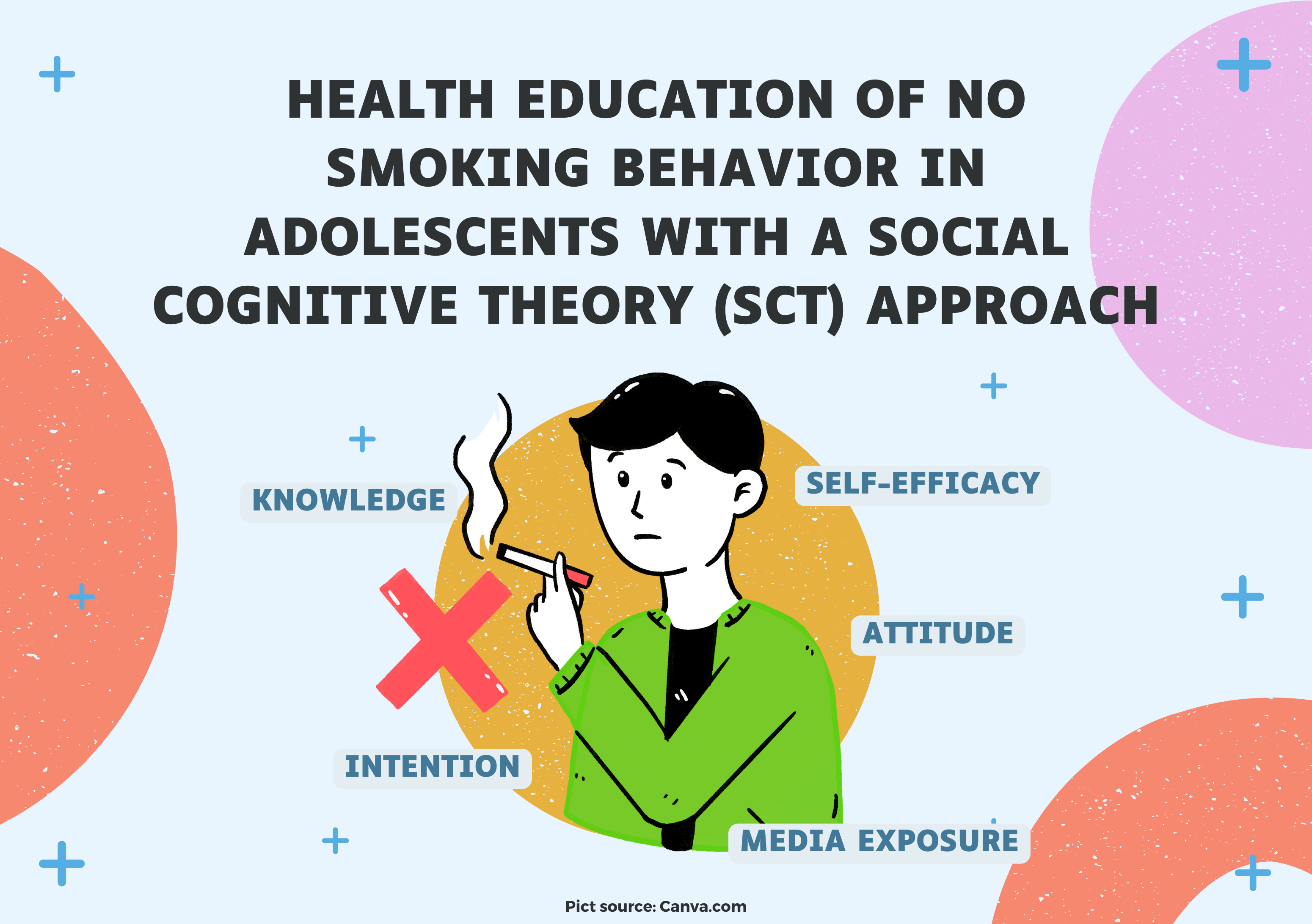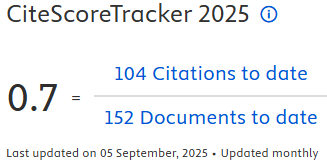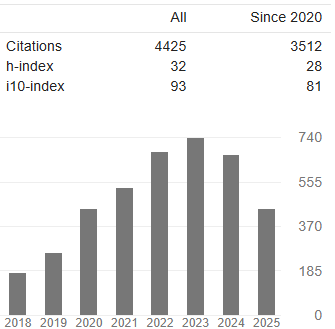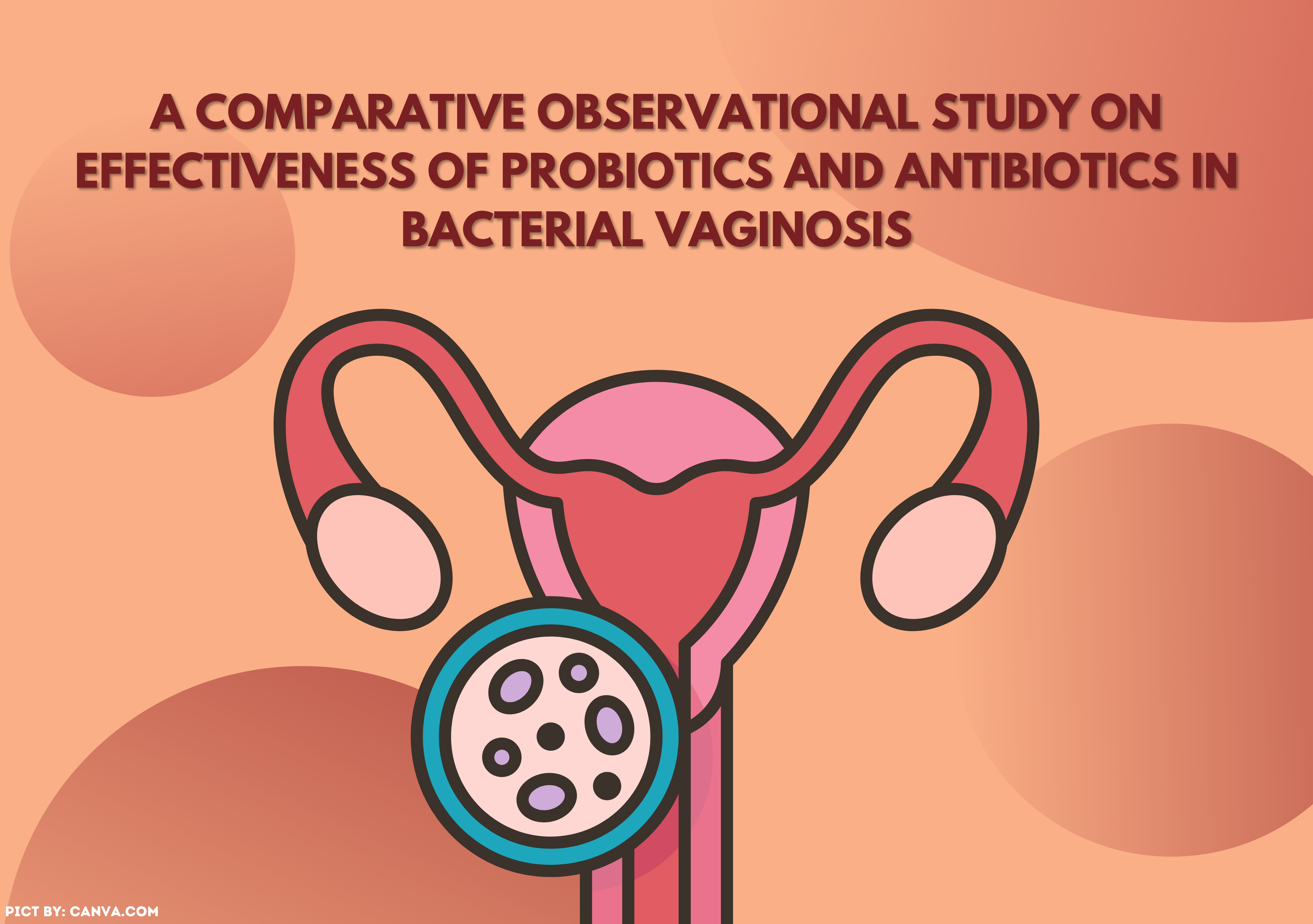HEALTH EDUCATION OF NO SMOKING BEHAVIOR IN ADOLESCENTS WITH A SOCIAL COGNITIVE THEORY (SCT) APPROACH

Downloads
Introduction: Smoking behavior is an action that can harm the smoker himself and can even harm others (passive smokers). Someone who is exposed to cigarettes for a long time will result in health problems and disease, Out of 800 junior high school youth in Kulon Progo, 5.3% are smokers. Aims: To determine the factors that influence directly or indirectly on the behavior of not smoking in adolescents. Methods: This case-control study was conducted in Kulon Progo Regency, Yogyakarta Special Region Province, Indonesia. The samples were 400 teenagers, 200 teenagers who smoked (cases) and 200 other teens who didn't smoke (controls). Data were collected using a questionnaire filled out by teenagers who are still active in school in junior high and high school. There are six variables studied including knowledge, media exposure, non-smoking attitudes, self-efficacy, non-smoking intentions and non-smoking behavior. Data were analyzed multivariately using STATA 13 Result: There are two variables (intention and self-efficacy) that have a direct influence on adolescents' non-smoking behavior, while the other three variables (knowledge, media exposure and attitude) have an indirect influence on adolescents' non-smoking behavior. Conclusion: Intention variable has the biggest contribution in influencing adolescent behavior not to smoke.
Abdullah, S. M. (2019). Social Cognitive Theory : A Bandura Thought Review published in 1982-2012. Psikodimensia, 18(1), 85. https://doi.org/10.24167/psidim.v18i1.1708
Alves, R. F., Precioso, J., & Beco, E. (2022). Smoking behavior and secondhand smoke exposure among university students in northern Portugal : Relations with knowledge on tobacco use and attitudes toward smoking. Pulmonology, 28, 193–202. https://doi.org/10.1016/j.pulmoe.2020.03.004
Aryoko, A., Denta, O., Karnaningrum, I., Fauziah, A., Baning, T., Progo, K., & Health, D. (2021). Smoke free area (sfa) district regulation support for establishment of a child friendly school (cfs) in kulon progo district. The Indonesian Journal of Public Health, 16(3), 483–491. https://doi.org/10.20473/ijph.v16i3.2021.483-491
Asta, P., & Artana, B. (2020). Pengaruh Status Merokok Terhadap Status Kontrol Asma Pada Pasien Asma Di Poliklinik Paru Rsup Sanglah Denpasar Pada Bulan Agustus-September 2015. Jurnal Medika Udayana, 9(2), 21–27.
Ayuningrum, I. Y., & Murti, B. (2019). Aplikasi Path Analysis dan Structural Equation Model dengan STATA. Program Studi Ilmu Kesehatan Masyarakat UNS.
Badea, C., Binning, K. R., Sherman, D. K., Boza, M., & Kende, A. (2021). Conformity to group norms: How group-affirmation shapes collective action. Journal of Experimental Social Psychology, 95, 104153. https://doi.org/10.1016/j.jesp.2021.104153
Bafunno, D., Catino, A., Lamorgese, V., Del Bene, G., Longo, V., Montrone, M., Pesola, F., Pizzutilo, P., Cassiano, S., Mastrandrea, A., Ricci, D., Petrillo, P., Varesano, N., Zacheo, A., & Galetta, D. (2020). Impact of tobacco control interventions on smoking initiation, cessation, and prevalence: A systematic review. Journal of Thoracic Disease, 12(7), 3844–3856. https://doi.org/10.21037/jtd.2020.02.23
Baniya, J., Thapa, N., & Gurung, U. (2020). harboring a Neglected Metallic Foreign Body in Maxillofacial Region for 12 Years. Indian Journal of Clinical Practice, 31(4).
Bashirian, S., Barati, M., Karami, M., Hamzeh, B., & Ezati, E. (2020). Predictors of shisha smoking among adolescent females in Western Iran in 2019 : Using the Prototype-Willingness Model. Tobacco Prevention & Cessation, 50, 1–9. https://doi.org/10.18332/tpc/125357
Bin Nik Mahdi, N. N. R., Aziz, A. B. A., Amin, R. B. M., & Azmi, I. S. M. B. M. (2020). Preventive practice on secondhand smoke and its associated factors among adults in a Suburban community in Kuala Terengganu. Malaysian Journal of Public Health Medicine, 20(1), 55–63. https://doi.org/10.37268/mjphm/vol.20/no.1/art.556
Boderie, N. W., Sheikh, A., Lo, E., Sheikh, A., Burdorf, A., Lenthe, F. J. Van, Mölenberg, F. J. M., & Been, J. V. (2023). Articles Public support for smoke-free policies in outdoor areas and ( semi- ) private places : a systematic review and meta-analysis. EClinicalMedicine, 59, 101982. https://doi.org/10.1016/j.eclinm.2023.101982
Cabral, P. (2022). E-cigarette use and intentions related to psychological distress among cigarette, e-cigarette, and cannabis vape users during the start of the COVID-19 pandemic. BMC Psychology, 10(1). https://doi.org/10.1186/s40359-022-00910-9
Chen, Y., Tilden, C., & Katherine, D. (2020). Adolescents ’ interpretations of e-cigarette advertising and their engagement with e-cigarette information : results from five focus groups. Psychology & Health,, 35(2), 163–176. https://doi.org/10.1080/08870446.2019.1652752
Chertok, I. R. A. (2020). Perceived risk of infection and smoking behavior change during COVID-19 in Ohio. Public Health Nursing, 37(6), 854–862. https://doi.org/10.1111/phn.12814
Daltveit, D. S., Klungsøyr, K., Engeland, A., Ekbom, A., Gissler, M., Glimelius, I., Grotmol, T., Madanat-Harjuoja, L., Ording, A. G., Sæther, S. M. M., Sørensen, H. T., Troisi, R., & Bjørge, T. (2020). Cancer risk in individuals with major birth defects: Large Nordic population based case-control study among children, adolescents, and adults. The BMJ, 371, 1–14. https://doi.org/10.1136/bmj.m4060
Dsouza, N., Serrano, N., Watson, K. B., Mcmahon, J., Devlin, H. M., Lemon, S. C., Eyler, A. A., Gustat, J., & Hirsch, J. A. (2022). Exploring Residents ’ Perceptions of Neighborhood Development and Revitalization for Active Living Opportunities. Preventing Chronic Disease Public Health Research, Practice, And Policy, 19(E56), 1–16. https://doi.org/10.5888/pcd19.220033
Ehsani-Chimeh, E., Sajadi, H. S., Behzadifar, M., Aghaei, M., Badrizadeh, A., Behzadifar, M., & Bragazzi, N. L. (2020). Current and former smokers among adolescents aged 12-17 years in Iran: A systematic review and meta-analysis. BMC Public Health, 20(1), 1–15. https://doi.org/10.1186/s12889-020-8255-2
Firth, J., Solmi, M., Wootton, R. E., Vancampfort, D., Schuch, F. B., Hoare, E., Gilbody, S., Torous, J., Teasdale, S. B., Jackson, S. E., Smith, L., Eaton, M., Jacka, F. N., Veronese, N., & Marx, W. (2020). RESEARCH REPORT A meta-review of “ lifestyle psychiatry ”: the role of exercise , smoking , diet and sleep in the prevention and treatment of mental disorders. World Psychiatry, 9(October), 360–380. https://doi.org/10.1002/wps.20773
Fithria, F., Adlim, M., Jannah, S. R., & Tahlil, T. (2021). Indonesian adolescents ’ perspectives on smoking habits : a qualitative study. BMC Public Health, 21(1), 82. https://doi.org/10.1186/s12889-020-10090-z
Flor, L. S., Reitsma, M. B., Gupta, V., Ng, M., & Gakidou, E. (2021). The effects of tobacco control policies on global smoking prevalence. Nature Medicine, 27(February), 239–243. https://doi.org/10.1038/s41591-020-01210-8
Hamzeh, B., Farnia, V., Moradinazar, M., Pasdar, Y., Shakiba, E., & Najafi, F. (2020). Pattern of cigarette smoking : intensity , cessation , and age of beginning : evidence from a cohort study in West of Iran. Substance Abuse Treatment, Prevention, and Policy, 1–9. https://doi.org/10.1186/s13011-020-00324-z
Haryati, W., Sahar, J., Rekawati, E., & Besral. (2021). A qualitative study of factors influencing adolescent smoking behaviors. Enfermería Clínica, 311, 593–596. https://doi.org/10.1016/j.enfcli.2021.04.019
Henning, M., & Henning, V. (2020). Grow Healthy Babies: The Evidence-Based Guidance Healthy Pragnancy Reducing Your Child’s Risk Asthma, Eczema, and Allergies. Rubinen.
Hogea, S. P., Tudorache, E., Fildan, A. P., Fira-Mladinescu, O., Marc, M., & Oancea, C. (2020). Risk factors of chronic obstructive pulmonary disease exacerbations. Clinical Respiratory Journal, 14(3), 183–197. https://doi.org/10.1111/crj.13129
Hunter, R. F., Montes, F., Murray, J. M., Sanchez-franco, S. C., Montgomery, S. C., Jaramillo, J., Tate, C., Kumar, R., Dunne, L., Ramalingam, A., Kimbrough, E. O., Krupka, E., & Zhou, H. (2020). MECHANISMS Study : Using Game Theory to Assess the Effects of Social Norms and Social Networks on Adolescent Smoking in Schools — Study Protocol. Frontiers in. Public Health 8:377., 8(August), 1–14. https://doi.org/10.3389/fpubh.2020.00377
Itanyi, I. U., Onwasigwe, C. N., Ossip, D., Uzochukwu, B. S. C., Mcintosh, S., & Emmanuel, N. (2020). Predictors of current tobacco smoking by adolescents in Nigeria : Interaction between school location and socioeconomic status. Tobacco Induced Diseases, 18, 13. https://doi.org/10.18332/tid/117959
Jiang, Y., Zhou, X., Cheng, L., & Li, M. (2020). The Impact of Smoking on Subgingival Microflora: From Periodontal Health to Disease. Frontiers in Microbiology, 11(January), 1–13. https://doi.org/10.3389/fmicb.2020.00066
Kamruzzaman M. (2021). Is BMI associated with anemia and hemoglobin level of women and children in Bangladesh: A study with multiple statistical approaches. PloS One,(16(10):e0259116). https://doi.org/10.1371/journal.pone.0259116
Keetile, M. (2020). Vulnerable Children and Youth Studies Patterns and correlates of health risk behaviours among adolescents in Botswana : 2001-2013. Vulnerable Children and Youth Studies, 15(3), 1–16. https://doi.org/10.1080/17450128.2020.1752961
Keetile, M., Ndlovu, K., Setshegetso, N., Yaya, S., & Serojane, F. (2023). Prevalence and correlates of tobacco use in Botswana : evidence from the 2014 Botswana STEPwise survey. BMC Public Health, 23, art 40), 1–9. https://doi.org/10.1186/s12889-022-14879-y
Kendrich, I., & Sinaga, B. Y. M. (2023). Knowledge, attitude, and behavior toward smoking among medical students in universitas sumatera utara. The Indonesian Journal of Public Health, 18(1), 1–10. https://doi.org/10.20473/ijph.v18i1.2023.1-10
Kosendiak, A., Król, M., Ściskalska, M., & Kepinska, M. (2022). The changes in stress coping, alcohol use, cigarette smoking and physical activity during covid-19 related lockdown in medical students in Poland. International Journal of Environmental Research and Public Health, 19(1). https://doi.org/10.3390/ijerph19010302
Kuga, K., Ito, K., Chen, W., Wang, P., & Fowles, J. (2021). Secondary indoor air pollution and passive smoking associated with cannabis smoking using electric cigarette device – demonstrative in silico study. Demonstrative in Silico Study. PLoS Computational Biology, 17(5), 1–11. https://doi.org/10.1371/journal.pcbi.1009004
Lareyre, O., Gourlan, M., Stoebner-delbarre, A., & Cousson-g, F. (2021). Characteristics and impact of theory of planned behavior interventions on smoking behavior : A systematic review of the literature. Preventive Medicine, 143, 106327. https://doi.org/10.1016/j.ypmed.2020.106327
Lee, Y., Huang, Y., & Tsai, F. (2021). ScienceDirect Prevalence and psychosocial risk factors associated with current cigarette smoking and hazardous alcohol drinking among adolescents in Taiwan. Journal of the Formosan Medical Association, 120(1), 265–274. https://doi.org/10.1016/j.jfma.2020.05.003
Li, C., & Gilleskie, D. B. (2021). The influence of endogenous behaviors among social pairs: Social interaction effects of smoking. Journal of Health Economics, 80, 102547. https://doi.org/10.1016/j.jhealeco.2021.102547
Lim, K. H., Lim, H. L., Ghazali, S. M., Kee, C. C., Taib, M. Z., Cheong, Y. L., Cheah, Y. K., Ismail, S. A., Heng, P. P., & Lim, J. H. (2021). Using The Theory Of Reasoned Action To Predict Smoking Intention Among Non-Smoking Secondary School Going Adolescents In Peninsular Malaysia. Malaysian Journal of Public Health Medicine, 21(2), 8–13. https://doi.org/10.37268/mjphm/vol.21/no.2/art.521
Ma, H., Li, X., Zhang, M., Liu, H., Jin, Q., Qiao, K., & Akbar, A. (2020). Relationships among smoking abstinence self-efficacy , trait coping style and nicotine dependence of smokers in Beijing. Tobacco Incluced Diseases, 18(72), 1–11. https://doi.org/10.18332/tid/125401
Masjedi, M. R., Ainy, E., Zayeri, F., & Paydar, R. (2020). Cigarette and Hookah Smoking in Adolescent Students using World Health Organization Questionnaire Global Youth Tobacco Survey ( GYTS ): A Pilot Study in Varamin City , Iran in 2016. Asian Pacific Journal of Cancer Prevention, 21(10), 3033-3037. https://doi.org/10.31557/APJCP.2020.21.10.3033
Mayangsari, H., & Mahmood, M. A. (2021). Active Smoking and Exposure To Passive Smoking Among Pregnant Women Attending a Primary Health Centre in Temanggung, Indonesia. The Indonesian Journal of Public Health, 16(1), 134. https://doi.org/10.20473/ijph.v16i1.2021.134-145
Mohmad, S., & Ismail, A. (2021). Smoking Behaviors and Attitudes Towards the Smoke-Free Campus Policy: a Systematic Review. Malaysian Journal of Public Health Medicine, 21(3), 124–135. https://doi.org/10.37268/mjphm/vol.21/no.3/art.1095
Murarkar, S., Gothankar, J., Doke, P., Dhumale, G., Pore, P. D., Lalwani, S., Quraishi, S., Patil, R. S., Waghachavare, V., Dhobale, R., Rasote, K., Palkar, S., Malshe, N., & Deshmukh, R. (2021). Prevalence of the Acute Respiratory Infections and Associated Factors in the Rural Areas and Urban Slum Areas of Western Maharashtra, India: A Community-Based Cross-Sectional Study. Frontiers in Public Health, 9(October), 1–7. https://doi.org/10.3389/fpubh.2021.723807
Murti, B. (2018). Prinsip dan Metode Riset Epidemiologi (Ke Lima). Program Studi Ilmu Kesehatan Masyarakat UNS.
Ng’ombe, J. N., Nedson, N. R., & Tembo, N. F. P. (2020). “ Look at Me , I Plan to Quit Smoking ”: Bayesian Hierarchical Analysis of Adolescent Smokers ’ Intention to Quit Smoking. Healthcare, 8,76, 1–18. https://doi.org/10.3390/healthcare8020076
https://doi.org/10.20944/preprints202002.0302.v1
Perera, A. D. C., Samarakoon, S. M. A. K., & Wanninayake, W. M. C. B. (2021). Theoretical Linkage between Theories of Social Comparison, Brand Congruence, Self Concept and Social Indentity. Asian Journal of Advanced Research and Reports, May, 19–28. https://doi.org/10.9734/ajarr/2021/v15i330377
Pertiwi, M. D., Martini, S., Artanti, K. D., & Widati, S. (2022). the Relationship of Hypertension, Genetic and Degree of Smoking With the Incidence of Copd At Haji Public Hospital Surabaya. The Indonesian Journal of Public Health, 17(2), 241–251. https://doi.org/10.20473/ijph.v17i2.2022.241-251
Purba, H. I. D., Kengganpanich, M., & Benjakul, S. (2022). The effect of smoking behavior on the quality of life among final-year students by using precede model in sari mutiara Indonesia university, Indonesia. Indonesian Jouran of Public Health, 17(2),207–218. https://doi.org/10.20473/ijph.v17i2.2022.207-218
Rahayu, D., & Yunarsih. (2020). Peer Support Dalam Peningkatan Motivasi Pemeriksaan Payudara Sendiri (SADARI) Sebagai Upaya Deteksi Dini CA Mammae. Journal of Ners Community, 11(02), 158–165.
Rosen, L. J., Zucker, D. M., Gravely, S., Bitan, M., Rule, A. M., & Myers, V. (2023). Tobacco Smoke Exposure According to Location of Home Smoking in Israel : Findings from the Project Zero Exposure Study. International Journal of Environmental Research and Public Health 20, 1–13. https://doi.org/10.3390/ijerph20043523
Sabina, E., Vries, D., Luisa, M., Vitória, P., Pereira, S. E., Muinos, G., Vries, H. De, & Luísa, M. (2020). Parents modelling , peer influence and peer selection impact on adolescent smoking behavior. Addictive Behaviors, 100,106131. https://doi.org/10.1016/j.addbeh.2019.106131
Shukr, B., Bartelli, D., Ward, K. D., Ray, M., Maziak, W., & Mzayek, F. (2023). The effect of exposure to tobacco smoking-related media messages on youths’ smoking behavior in Jordan: A longitudinal, school-based study. Preventive Medicine, 166, 107386. https://doi.org/10.1016/j.ypmed.2022.107386
Snell, L. M., Colby, S. M., Deatley, T., Cassidy, R., & Tidey, J. W. (2022). Associations Between Nicotine Knowledge and Smoking Cessation Behaviors Among US Adults Who Smoke. Nicotine and Tobacco Research, 24(November 2021), 855–863. https://doi.org/10.1093/ntr/ntab246
Tapera, R., Mbongwe, B., Mhaka-mutepfa, M., Lord, A., Phaladze, A., & Zetola, N. M. (2020). The theory of planned behavior as a behavior change model for tobacco control strategies among adolescents in Botswana. PloS One, 15(6), 1–13. https://doi.org/10.1371/journal.pone.0233462
Tattan-Birch, H., Perski, O., Jackson, S., Shahab, L., West, R., & Brown, J. (2021). COVID-19, smoking, vaping and quitting: a representative population survey in England. Addiction, 116(5), 1186–1195. https://doi.org/10.1111/add.15251
Wang, L., Chen, J., Ho, S. Y., Leung, L. T., Wang, M. P., & Lam, T. H. (2020). Exposure to e-cigarette advertising , attitudes , and use susceptibility in adolescents who had never used e-cigarettes or cigarettes. BMC Public Health, 20, 1–9. https://doi.org/10.1186/s12889-020-09422-w
Wardoyo, H. (2017). Kebanyakan dari Pedesaan, Tinggi Jumlah Perokok Remaja di Kulon Progo. Yogyakarta. Harian Kedaulatan Rakyat, 03 Juni.
Yanuardianto, E. (2019). Teori Kognitif Sosial Albert Bandura (Studi Kritis Dalam Menjawab Problem Pembelajaran di Mi). Auladuna : Jurnal Prodi Pendidikan Guru Madrasah Ibtidaiyah, 1(2), 94–111. https://doi.org/10.36835/au.v1i2.235
Zhao, X., Dichtl, F. F., & Foran, H. M. (2022). Predicting smoking behavior : intention and future self-continuity among Austrians. Psychology, Health & Medicine, 27(5), 1042–1051. https://doi.org/10.1080/13548506.2020.1842898
Copyright (c) 2025 The Indonesian Journal of Public Health

This work is licensed under a Creative Commons Attribution-NonCommercial-ShareAlike 4.0 International License.
- The authors agree to transfer the transfer copyright of the article to The Indonesian Journal of Public Health effective if and when the paper is accepted for publication.
- Authors and other parties are bound to the Creative Commons Attribution-NonCommercial-ShareAlike 4.0 International License for the published articles, legal formal aspect of journal publication accessibility refers to Creative Commons Attribution-NonCommercial-ShareAlike 4.0 International License (CC BY-NC-SA), implies that:
- Attribution ” You must give appropriate credit, provide a link to the license, and indicate if changes were made. You may do so in any reasonable manner, but not in any way that suggests the licensor endorses you or your use.
- NonCommercial ” You may not use the material for commercial purposes.
- ShareAlike ” If you remix, transform, or build upon the material, you must distribute your contributions under the same license as the original.































